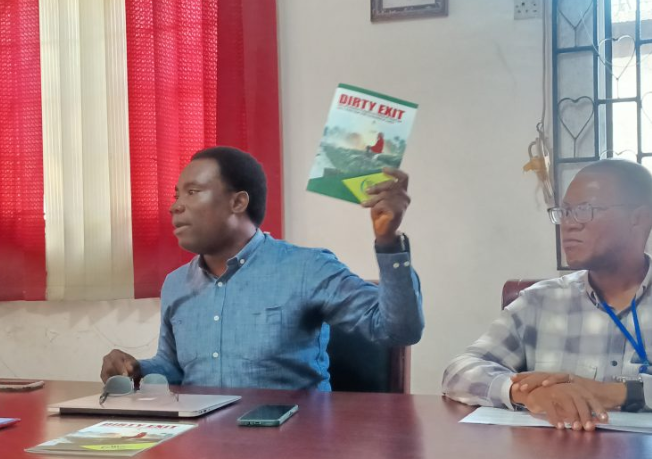Mr Ken Henshaw, Executive Director, We The People, presenting a report titled Dirty Exit.
Abasifreke Effiong
International oil companies are running away from Nigeria. The big names that dominated the energy sector in the country are in a hurry to leave after 65 years of extensive mining of crude onshore, offshore and in the deep waters of the Niger Delta. They want to avoid the huge legacies of devastating, heartrending ecological and social impacts on the region and the people. IOCs have been repeatedly indicted by scientific investigations and researches on oil spills, gas flaring, and other below standard operational procedures which have eroded livelihoods and poisoned the environment.
At least four IOCs are divesting. One is divesting into cashew production. ExxonMobil is exploring oil mining opportunities in a new environment – Guyana. Shell, Chevron, and Eni have sold off some of her mining assets in the Niger Delta to Nigerian companies. Between 2010 and 2022, Shell had sold at least eight of its Oil Mining Leases (OMLs) and other assets in the region. Chevron, an American multinational energy corporation, started selling off its assets in the region since 2015. ExxonMobil reached an agreement in February 2022 to sell its equity in Mobil Producing Nigeria Unlimited to Seplat Energy. It goes on and on.
Shell cited oil theft and sabotage as reasons for its divestment from Nigeria’s oil and gas sector. . Ben van Beurden, Shell’s CEO said oil theft and sabotage is ‘an exposure that doesn’t fit with (the company’s) risk appetite anymore.’ Chevron wants to focus on growing its U.S shale output. An executive of ExxonMobil told a gathering that high cost of production and cumbersome operating environment are some of the reasons one of its subsidiaries is divesting. “It cost more to produce in Nigeria, and takes more time to process a document, say a mining lease in Nigeria, something you can do in three days in Guyana”, a staff of ExxonMobil said.
A human and ecological rights organisation, We The People, has in a very detailed report titled “Dirty Exit. Why oil companies in Nigeria are selling off assets and how it denies Niger Delta Communities of Justice”, published this year controverted the reasons for exit given by the IOCs. The companies are running away from “accountability and ecological justice”, Ken Henshaw, Executive Director, We The People, said while presenting the report to journalists in Uyo.
READ:
• Host communities shut down OML 30 flow stations
• Small businesses in Akwa Ibom are leveraging on Ibom 3000 project
The reports says IOCs have shown more and more anxiety to run away after the Dutch Court in the case of four farmers versus Shell ruled that mother oil company is legally liable for the abuses carried out by its Nigerian subsidiaries. The are running away from the avalanche of lawsuits in Nigeria and home countries demanding justice for abuses, the report noted. They don’t want to be caught up by the “polluter pays” principle which is now recognised by United Nations Environmental Programme (UNEP). UNEP says polluters must pay for ecological damages. This implies that each responsible organisation must commit financially to remediation and restoration activities before they divest. Ongoing divestment is a strategy for oil companies to dodge this obligation. Ecological justice is a right.
The companies are giving convenient excuses for their planned exit. It is within their right to do so. The Nigerian government and the people must assist them to exercise their exit right without infringing on host communities’ constitutionally guaranteed rights to a clean, poison-free, pollution-free, healthy environment. They must not run away and leave the communities desolate. Communities in the Niger Delta have been affected by gas flaring, oil spills and other hazards as a result of oil mining operations. Oil companies in Nigeria are said to flare about 2.5 billion cubic feet of gas annually, the highest in the world and about 25% of UK’s total natural gas consumption and 40% of Africa’s consumption in 2001. Gas flaring is associated with prevalent of lung and skin cancer, premature rupture of membrane, cesarean section, postpartum haemorrhage, blindness, early menopause, etc.
Environmental right groups and the people of the Niger Delta are demanding and calling for the conduct of thorough hydrocarbon impact assessment in communities where crude oil mining has taken place. We The People, is more specific in her recommendations. It recommends a divestment framework with a “scientifically developed post hydrocarbon impact assessment report that establishes the exact ecological and livelihoods impacts of oil extraction; health audit of people located in close proximity to extraction sites, and others exposed to oil contamination and gas flaring; detailed plan and cost for remediating ecological, livelihoods and health impact; establishment of independent frameworks for remediating all identified impacts.”
The organisation called on the federal government of Nigeria to immediate place a moratorium on all oil company divestment in the Niger Delta pending ascertaining the issues of community concerns. Representatives of the people of the Niger Delta especially those from the impacted communities must prevail on the federal government to include ecological, health and livelihoods concerns as part of the divestment policy.
















